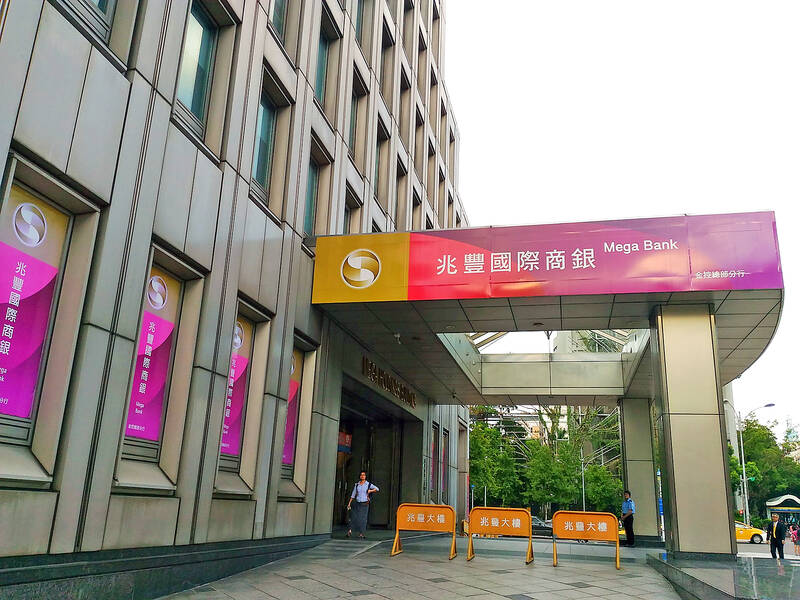State-run Mega International Commercial Bank (兆豐銀行) last quarter won a competition among the 40 lenders in Taiwan — all of which benefited from interest rate hikes — based on measuring profit contributions per employee, a recent report by the central bank found.
Individual staffers at Mega Bank generated NT$6.97 million (US$225,420) between January and March, overtaking Shanghai Commercial and Savings Bank (上海商業儲蓄銀行), which finished in second place with NT$6.5 million per staffer, according to the report that ranked the lenders’ pre-tax profitability divided by their number of employees.
It is relatively difficult for large banks to rank high since they hire more workers than their small and medium peers — excluding Export-Import Bank of the Republic of China (中國輸出入銀) and Agricultural Bank of Taiwan (全國農業金庫) because of their special operations — the central bank said.

Photo: Lee Chin-hui, Taipei Times
With a focus on international trade financing, Mega Bank reaped a windfall from interest rate hikes at home and abroad, it pointed out.
HSBC Taiwan ranked third with NT$5.54 million per employee, a rare achievement for banks with foreign parents, the central bank said.
Taipei Fubon Commercial Bank (台北富邦銀行) and King’s Town Bank (京城銀行) secured the fourth and fifth rankings with NT$4.36 million and NT$4.3 million per worker respectively, it said.
Cathay United Bank (國泰世華銀行), CTBC Bank (中國信託銀行), Bank of Taiwan (臺灣銀行), First Commercial Bank (第一銀行) and E.Sun Commercial Bank (玉山銀行) made up the rest of the top 10 ranking with pre-tax profits of NT$3.16 million to NT$4.08 million per employee, it said. Web-only O-Bank (王道銀行) fell from the top 10 list this time.
Together, the 40 banks posted NT$127.09 billion in pre-tax income, soaring 40 percent from the same time last year, it said, as interest rate hikes widened their profit margin, while financial markets were less hostile.
The central bank hiked interest rates five times between March last year and March this year, driving up borrowing costs by 0.75 percentage points. The US Federal Reserve made steeper tightening moves, and the interest rate gaps allowed domestic lenders to make generous gains in currency swap operations.
Still, nine lenders recorded decreased earnings, even though the majority 31 registered profit growth, the report found.

Semiconductor business between Taiwan and the US is a “win-win” model for both sides given the high level of complementarity, the government said yesterday responding to tariff threats from US President Donald Trump. Home to the world’s largest contract chipmaker, Taiwan Semiconductor Manufacturing Co (TSMC, 台積電), Taiwan is a key link in the global technology supply chain for companies such as Apple Inc and Nvidia Corp. Trump said on Monday he plans to impose tariffs on imported chips, pharmaceuticals and steel in an effort to get the producers to make them in the US. “Taiwan and the US semiconductor and other technology industries

SMALL AND EFFICIENT: The Chinese AI app’s initial success has spurred worries in the US that its tech giants’ massive AI spending needs re-evaluation, a market strategist said Chinese artificial intelligence (AI) start-up DeepSeek’s (深度求索) eponymous AI assistant rocketed to the top of Apple Inc’s iPhone download charts, stirring doubts in Silicon Valley about the strength of the US’ technological dominance. The app’s underlying AI model is widely seen as competitive with OpenAI and Meta Platforms Inc’s latest. Its claim that it cost much less to train and develop triggered share moves across Asia’s supply chain. Chinese tech firms linked to DeepSeek, such as Iflytek Co (科大訊飛), surged yesterday, while chipmaking tool makers like Advantest Corp slumped on the potential threat to demand for Nvidia Corp’s AI accelerators. US stock

The US Federal Reserve is expected to announce a pause in rate cuts on Wednesday, as policymakers look to continue tackling inflation under close and vocal scrutiny from US President Donald Trump. The Fed cut its key lending rate by a full percentage point in the final four months of last year and indicated it would move more cautiously going forward amid an uptick in inflation away from its long-term target of 2 percent. “I think they will do nothing, and I think they should do nothing,” Federal Reserve Bank of St Louis former president Jim Bullard said. “I think the

‘LASER-FOCUSED’: Trump pledged tariffs on specific sectors, including semiconductors, pharmaceuticals, steel, copper and aluminum, and perhaps even cars US President Donald Trump said he wants to enact across-the-board tariffs that are “much bigger” than 2.5 percent, the latest in a string of signals that he is preparing widespread levies to reshape US supply chains. “I have it in my mind what it’s going to be but I won’t be setting it yet, but it’ll be enough to protect our country,” Trump told reporters on Monday night. Asked about a report that incoming US Secretary of the Treasury Scott Bessent favored starting with a global rate of 2.5 percent, Trump said he did not think Bessent supported that and would not